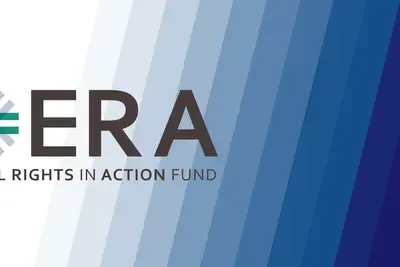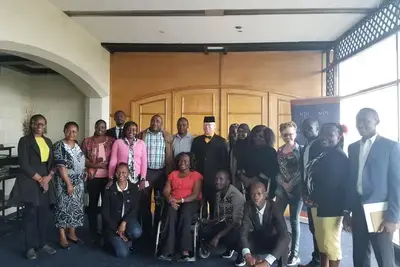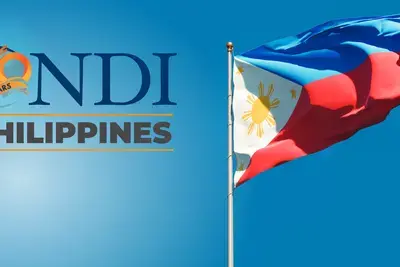
The 2023 fellows of the KASALI Tayo Youth with Disabilities Leadership Program (YDLP) 2023, alongside the organizers concluded the training with a group photo. Here the group all signs the letter “K” in sign alphabet, the official handsign for the program.
Success Story
Partner Profile: Project Inclusion Network
In recognition of the International Day of People with Disabilities, NDI is highlighting the essential work of partners who are at the forefront of fighting for greater levels of equality and organizing to shift social norms and perceptions and reduce barriers to political participation for persons with disabilities.
NDI interviewed Project Inclusion Network, a partner organization that works with civil society and government stakeholders to improve education, employment and participation outcomes for people with disabilities in the Philippines. Project Inclusion Network (PIN) told us how they are conducting action research, building coalitions and engaging the public sector to advocate for the inclusion of people with disabilities in policymaking processes.
What does inclusion in civic and political life mean to you/your organization?
The disability sector in the Philippines faces a significant challenge as it remains an underrepresented minority in our civic spaces. Persons with disabilities are a marginalized sector, and their voices are not adequately considered in the formulation of policies and initiatives that directly impact their lives. This exclusionary trend underscores the urgency for a transformative shift in the dynamics of civic and political engagement.
In our vision of true inclusion, we recognize that it goes beyond mere representation; it involves actively engaging persons with disabilities in decision-making processes that affect their daily lives. Inclusion, to us, means fostering an environment where the diverse perspectives and unique needs of individuals with disabilities are not only acknowledged but are integral to the shaping of civic and political landscapes.
True inclusion, in our perspective, also means a participatory democracy where every voice, regardless of ability, is heard, valued and actively contributes to the fabric of our civic and political life. It's about ensuring that every citizen, irrespective of their physical abilities, plays an integral role in the democratic processes that govern our society.
How is your organization working to address barriers to political participation and eliminate discrimination against people with disabilities in your country?
Firstly, we work towards providing people with disabilities the platform to advocate for themselves through our work in facilitating employment for people with disabilities. Through these initiatives, we empower job seekers with disabilities by facilitating career coaching and skills training for them, as well as developing and improving market access to community enterprises. We also enable employers to build organizational awareness and acceptance of disability and support communities advocating for disability inclusion in the workplace.
These activities are best facilitated through our “Access to Work” model, which aims to match employers with job seekers with disabilities through a series of orientations and consultations prior to job matching. This is also supported by the Philippine Business and Disability Network (PBDN), a local platform for learning, collaboration and support for disability inclusion advocates from the private sector. It also serves as the local chapter of the Global Business and Disability Network, supported by the International Labor Organization. Throughout 2023 so far, there were a total of 11 people with disabilities hired, 515 referred to employers, and 56 assessed through these activities.
Alongside this initiative, we work with civil society and government to improve education, employment and participation outcomes for persons with disabilities. PIN is involved in policy advocacy through action research, coalition-building and public sector engagement. PIN has published and co-published a total of 4 papers on disability inclusion in the workplace. Recently, we conducted activities through three projects – KASALI Kami, Bahagi Kami, and AcTVET Opportunities (Disability-Inclusive and Accessible TVET Activate Opportunities for Persons with Disability).
In the past year, can you briefly share a success from your organization’s contribution to strengthening the disabled persons movement?
In this year alone, we were able to strengthen the engagement of persons with disabilities in civic processes through different capacity development initiatives. First, our KASALI Kami Youth with Disabilities Leadership Program aims to recognize the capabilities and build the skills of young people with disabilities. Through this program, PIN convened 20 young leaders with disabilities from across the country to support their development by identifying their strengths and areas of interest and conducting capacity-building sessions focused on leadership, communication, civic engagement and project management. Also, we were able to conduct a webinar on “Breaking Barriers: Redefining Disability Representation in Media,” which reached 132 attendees representing local and international organizations.
Next, PIN’s Bahagi Kami program aimed to build the capacities of organizations of persons with disabilities (OPDs) in representing themselves in processes, conversations and collective movements on concerns and issues that affect the lives of persons with disabilities and Filipinos in general. PIN convened 12 OPDs from across the country, and these organizations are now planning and implementing action plans within their communities.
Alongside this, PIN also set their AcTVET Opportunities (Disability-Inclusive and Accessible TVET – Activate Opportunities for Persons with Disability) activity in motion. Ultimately, this year, we focused on supporting the mainstreaming initiatives of persons with disabilities in the Technical Education and Skills Development Authority's (TESDA) policies and programs involving capacity development and technical assistance.
What impact has NDI’s partnership had on your organization?
NDI’s support through the Equal Rights in Action Fund has greatly contributed to the success of the organization’s initiatives, particularly that of the Bahagi Kami Project. Through NDI, we were able to support 12 OPDs from across the country, equipping them with the necessary skills and tools to participate in their community's local planning and budgeting process.
Alongside this, with NDI, we are able to work towards creating a more inclusive and equitable society for people with disabilities in the Philippines. We have utilized tools such as PIN’s “Citizen Participation Toolkit for Disability-Inclusive Planning and Budgeting Process” to ensure the voices and needs of people with disabilities are taken into account in the policymaking and programming process.



